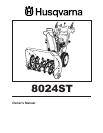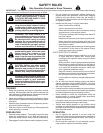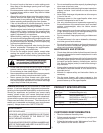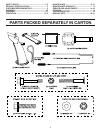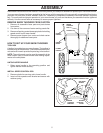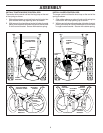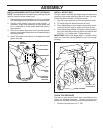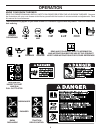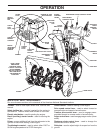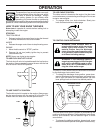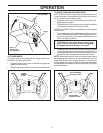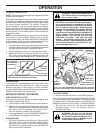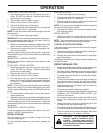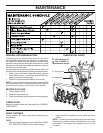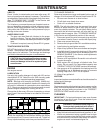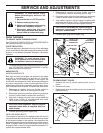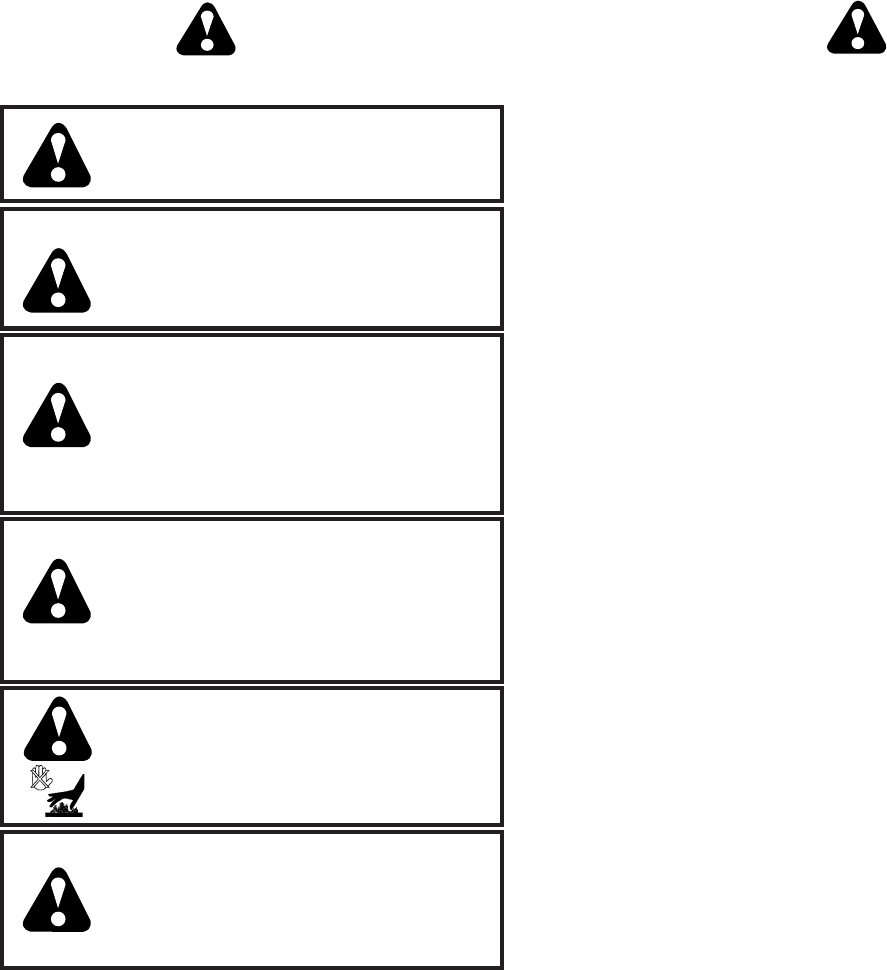
2
Safe Operation Practices for Snow Throwers
IMPORTANT: This machine is capable of amputating hands and feet and throwing objects. Failure to observe the following
safety instructions could result in serious injury or death.
SAFETY RULES
WARNING: This snow thrower is for
use on sidewalks, driveways and other
ground level surfaces. Caution should
be exercised while using on sloping
surfaces. Do not use snow thrower on
surfaces above ground level such as
roofs of residences, garages, porches
or other such structures or buildings.
WARNING: Snow throwers have ex-
posed rotating parts, which can cause
severe injury from contact, or from
material thrown from the discharge
chute. Keep the area of operation clear
of all persons, small children and pets
at all times including startup.
WARNING: Always disconnect spark
plug wire and place it where it cannot
contact plug in order to prevent acci-
dental starting when setting up, trans-
porting, adjusting or making repairs.
Look for this symbol to point out im-
portant safety precautions. It means
CAUTION!!! BECOME ALERT!!! YOUR
SAFETY IS INVOLVED.
• Do not operate the equipment without wearing ad-
equate winter outer garments. Avoid loose, dangling
clothing, such as scarves, which can get caught in
rotating parts. Wear footwear that will improve footing
on slippery surfaces.
• Handle fuel with care; it is highly flammable.
- Never smoke while refueling.
- Use an approved fuel container.
- Never remove fuel tank cap or add fuel to a running
engine (motor) or hot engine (motor).
- Fill fuel tank outdoors with extreme care. Never fill
fuel tank indoors.
- Replace fuel cap securely and wipe up spilled fuel.
- Never store fuel or snow thrower with fuel in the
tank inside of a building where fumes may reach an
open flame or spark.
- Check fuel supply before each use, allowing space
for expansion as the heat of the engine (motor)
and/or sun cause fuel to expand.
STATIC ELECTRICITY HAZARD -
- Never fill containers inside a vehicle or on a truck
or trailer bed with a plastic liner. Always place
containers on the ground, away from your vehicle
before filling.
- When practical, remove gas-powered equipment
from the truck or trailer and refuel it on the ground.
If this is not possible, then refuel such equipment
on a trailer with a portable container, rather than
from a gasoline dispenser nozzle.
- Keep the nozzle in contact with the rim of the fuel
tankopening at all times, until refueling is complete.
Do not use a nozzle lock-open device.
- If fuel is spilled on clothing, change clothing imme-
diately.
• For all units with electric starting motors use electric
starting extension cords certified CSA/UL. Use only
with a receptacle that has been installed in accordance
with local inspection authorities.
• If snow thrower must be operated over gravel surface,
use extra caution and be sure skid plates are adjusted
to lowest (highest scraper clearance) position.
• Never attempt to make any adjustments while the
engine (motor) is running (except when specifically
recommended by manufacturer).
• Let engine (motor) and snow thrower adjust to outdoor
temperatures before starting to clear snow.
• Always wear safety glasses or eye shields during
operation or while performing an adjustment or repair
to protect eyes from foreign objects that may be thrown
from the snow thrower.
OPERATION
• Do not operate this machine if you are under the
influence of alcohol or taking drugs or other medication
which can cause drowsiness or affect your ability to
operate this machine.
• Do not use this machine if you are mentally or physi-
cally unable to operate this machine safely.
TRAINING
• Read the operating and service instruction manual
carefully. Be thoroughly familiar with the controls and
the proper use of the equipment. Know how to stop the
unit and disengage the controls quickly.
• Never allow children to operate the equipment. Never
allow adults to operate the equipment without proper
instruction.
• Keep the area of operation clear of all persons, particu-
larly small children and pets.
• Exercise caution to avoid slipping or falling especially
when operating in reverse.
PREPARATION
• Remove foreign objects. Thoroughly inspect the area
where the equipment is to be used and remove all
doormats, sleds, boards, wires, rocks & landscaping.
• Disengage all clutches before starting engine (motor).
CAUTION: Muffler and other engine
parts become extremely hot during
operation and remain hot after engine
has stopped. To avoid severe burns on
contact, stay away from these areas.
WARNING: Engine exhaust, some of its
constituents, and certain vehicle com-
ponents contain or emit chemicals
known to the State of California to cause
cancer and birth defects or other repro-
ductive harm.



